"The One on the Right is on the Left"
Since it's TGIF and the weekend is upon us, here is a bit of entertainment (sorry Gayle):
Labels: Entertainment, Johnny Cash, YouTube
Illuminating the untempered soul and the blunt mind by hammering out sparks of Clarity and Truth on the Anvil of Debate.
"Sometimes, you go to war with the media you have, not the media you wish you had"
-Wordsmith
Labels: Entertainment, Johnny Cash, YouTube

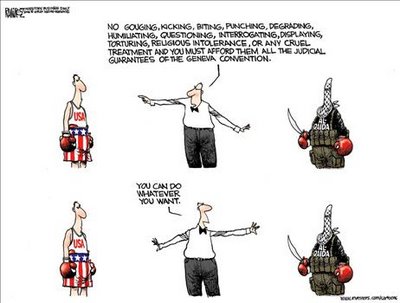
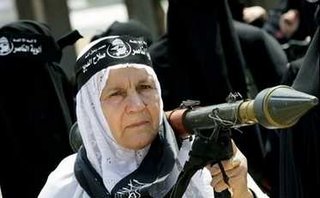
Labels: Hamas, Hezbollah, homicide bomber, humor, Palestine, political cartoons
Labels: Hamas, Indoctrination, Saturday Cartoon
Labels: Hezbollah, Israel, Israel-Lebanon, Violence





Labels: Hollywood Liberals
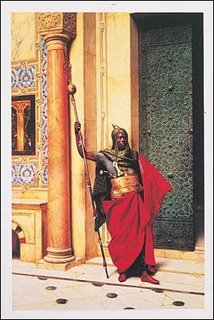
"In the seventh century of the Christian era, a wandering Arab of the lineage of Hagar [i.e., Muhammad], the Egyptian, [.....] Adopting from the new Revelation of Jesus, the faith and hope of immortal life, and of future retribution, he humbled it to the dust by adapting all the rewards and sanctions of his religion to the gratification of the sexual passion. He poisoned the sources of human felicity at the fountain, by degrading the condition of the female sex, and the allowance of polygamy; and he declared undistinguishing and exterminating war, as a part of his religion, against all the rest of mankind. THE ESSENCE OF HIS DOCTRINE WAS VIOLENCE AND LUST.- TO EXALT THE BRUTAL OVER THE SPIRITUAL PART OF HUMAN NATURE.... Between these two religions, thus contrasted in their characters, a war of twelve hundred years has already raged. The war is yet flagrant ... While the merciless and dissolute dogmas of the false prophet shall furnish motives to human action, there can never be peace upon earth, and good will towards men."
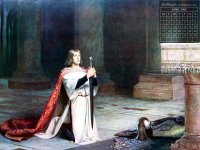 of pillaging and murder, instigated by the Christians. White Europeans are made out to be imperialistic, racist, slave-owning societies. Swept under the rug of consciousness, is the fact that it was in the West, where the first anti-slavery movement began. And it was started by Christians. And as for the Crusades, according to Thomas Madden, they were in every way, defensive wars, waged as a response to more than four centuries of Muslim aggression; and were no more offensive than was the American-led invasion of Normandy.
of pillaging and murder, instigated by the Christians. White Europeans are made out to be imperialistic, racist, slave-owning societies. Swept under the rug of consciousness, is the fact that it was in the West, where the first anti-slavery movement began. And it was started by Christians. And as for the Crusades, according to Thomas Madden, they were in every way, defensive wars, waged as a response to more than four centuries of Muslim aggression; and were no more offensive than was the American-led invasion of Normandy.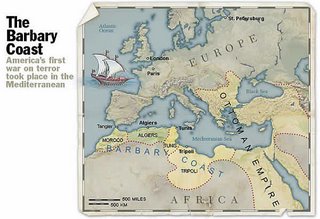
"Piracy was deemed an acceptable and important component of the al-jihad fi’l-bahr, or the holy war at sea, and the ta’ifa, or community, of seamen became integral to the Muslim struggle with Christendom,"By 1662, these Muslim pirates- Barbary corsairs- had refined piracy to a sophisticated, highly disciplined and well-organized racket. And,
“In that year, England revived the ancient custom of paying tribute, which meant that corsairs agreed to spare English ships for an annual bribe paid in gold, jewels, arms, and supplies. The custom quickly spread to all countries trading the Mediterranean."2Not just England, but all European powers paid bribes and tributes to the Barbary rulers in order to avoid having their ships boarded and ransacked, and their citizens enslaved. France paid 200,000 annually, to Algiers alone. Britain, up to 280,000! When the United States gained its independence from Britain, it also lost the protective umbrella of Britain's protection payments to the Barbary rulers.
“America was a great nation, but unfortunately a state of war existed between America and Tripoli. Adams questioned how that could be, given there had been no injury, insult, or provocation on either side. The Barbary States were the sovereigns of the Mediterranean all the same, he was told, and without a treaty of peace there could be no peace between Tripoli and America. His Excellency was prepared to arrange such a treaty…The sooner peace was made between America and the Barbary States the better. Were a treaty delayed, it would be more difficult to make. A war between Christian and Christian was mild, prisoners were treated with humanity; but, warned His Excellency, a war between Muslim and Christian could be horrible.”3Bill Bennett, in his new book, "America, the Last Best Hope", describes it this way:
The Ambassador answered us that it was founded on the Laws of the Prophet, that it was written in their Koran, that all nations who should not have answered their authority were sinners, that it was their right and duty to make war upon them wherever they could be found, and to make slaves of all they could take as prisoners.Joshua E. London's description of the meeting in his book:
"The response was unnerving. As Adams and Jefferson later reported to the Continental Congress, the ambassador said the raids were a jihad against infidels. Muslim privateers felt "it was their duty to make war upon them [non-Muslims] wherever they could be found, and to make slaves of all they could as Prisoners, and that every Mussleman [Muslim] who should be slain in Battle was sure to go to Paradise."Abdrahaman made it known that peace with all the Barbary States might amount to 200,000 to 300,000 guineas. Because it was such a vast amount, and Congress had only guaranteed them 80,000, they had to refer back to Congress.
The Americans now had two choices: pay tribute or fight the pirates."
"British, French, and Dutch ships could sail the waters with impunity, while relying corsairs of both complexions [Muslim Barbary Corsairs and Christian Malta Corsairs- Wordsmith] to harrass the shipping of their competitors. This cunning arrangement allowed British and French merchantment to take a substantial proportion of the Mediterranean trade. In France, there was clear and sometimes explicit understanding that the raids of the Barbary corsairs had advantages: 'We are certain that it is not in our interest that all the Barbary corsairs be destroyed, ' ran one anonymous French memo, 'since then we would be on par with all the Italians and the peoples of the North Sea.' " 6
"in anticipation of fighting the Barbary pirates. Yet, in 1795, Congress approved a treaty with Algiers that led to the release of the hostages the following year, but that cost the US nearly $642,500 in cash, munitions, and a 36-gun frigate, besides a yearly tribute of $21,600 worth of naval supplies! Ransom rates were officially set for those Americans already in Barbary prisons: $4000 for each passenger and $1,400 for each cabin boy."7By 1797, the U.S. had 3 naval warships, including "Old Ironside" herself, the USS Constitution.
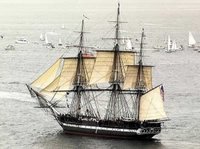
 In 1800, the U.S. ship, George Washington, sailed along the Mediterranean to pay its annual tribute to Algiers. But the Bey of Algiers ordered Captain Bainbridge to sail on to Constantinople instead, to deliver the consignment of tribute directly to the Turkish Ottoman Sultan himself. To add insult to humiliating injury, Bainbridge was also made to take down the American flag and raise up the Algerian colors in its stead, aboard the George Washington.
In 1800, the U.S. ship, George Washington, sailed along the Mediterranean to pay its annual tribute to Algiers. But the Bey of Algiers ordered Captain Bainbridge to sail on to Constantinople instead, to deliver the consignment of tribute directly to the Turkish Ottoman Sultan himself. To add insult to humiliating injury, Bainbridge was also made to take down the American flag and raise up the Algerian colors in its stead, aboard the George Washington."Upon viewing the Americans’ weakness, the other Barbary States stepped up their blackmail demands."7By the spring of 1801, when Yusuf still did not receive his monetary "gift" from the U.S. for the death of George Washington, he sent for the U.S. consul to be brought before him. After making the consul kiss his hand, the Pasha proclaimed that the annual tribute that the U.S. was to pay Tripoli, would now be raised in the amount of $250,000; plus $25,000 in goods of his choice. Refusal to pay up would be taken as an act of war. On May 14th, he ordered that the flag staff at the American consul be cut down
“To make his point, Yusuf had his soldiers chop down the flagpole in front of the American consulate, a significant gesture in a land of no tall trees and one that meant war.”8So why had America not paid up? Because by 1801, the Pasha was now dealing with President Thomas Jefferson....and the peace-loving Jefferson, itching for war for the past 17 years, was having no more of this nonsense.
 On February 16, 1804, Lieutenant Stephen Decatur led 74 brave volunteers on a mission to rescue the ship, lest it be used against the Americans themselves. Sailing covertly at night in the Intrepid, a renamed captured Tripolitan ketch, Decatur and his men stole aboard the Philadelphia, were forced to set the Philadelphia ablaze instead of retaking her, and made their escape before an alarm was sounded. This heroic raid led the famous British admiral, Horatio Nelson, to call it "the most bold and daring act of the age". The crew of the Philadelphia, unfortunately, remained captives; and the asking price for their return was $200,000.
On February 16, 1804, Lieutenant Stephen Decatur led 74 brave volunteers on a mission to rescue the ship, lest it be used against the Americans themselves. Sailing covertly at night in the Intrepid, a renamed captured Tripolitan ketch, Decatur and his men stole aboard the Philadelphia, were forced to set the Philadelphia ablaze instead of retaking her, and made their escape before an alarm was sounded. This heroic raid led the famous British admiral, Horatio Nelson, to call it "the most bold and daring act of the age". The crew of the Philadelphia, unfortunately, remained captives; and the asking price for their return was $200,000."Taught by revelation that war with the Christians will guarantee the salvation of their souls, and finding so great secular advantages in the observance of this religious duty [i.e. keeping captured cargoes] their inducements to desperate fighting are very powerful."9At the same,
"Eaton also possessed the intellectual honesty to acknowledge that the cruelty of the Barbary slavery he witnessed was '...but a copy of the very barbarity which my eyes have seen in my own country. And yet we boast of liberty and national justice.'"10Eaton came up with the plan of replacing then Pasha of Tripoli, Yusuf Karamanli, with his exiled older brother, Hamet Karamanli, who resided in Egypt. Eaton wrote to President Jefferson with the proposal of a military coup to set the rightful heir back into power. Permission was granted him.
"We find it almost impossible to inspire these wild bigots with confidence in us or to persuade them that, being Christians, we can be otherwise than enemies to Musselmen [Muslims]. We have a difficult undertaking."Serving with Eaton was a Marine Lieutenant, Presley O'Bannon from the USS Argus. He was an Irish-American from Marshall, in Fauquier County, Virginia. On April 25, 1805, after 45 days, they came to Derna.
Surely by then, many in this small army must have been happy at the prospect of battle, as opposed to dying a miserable death in the desert. A message was sent to the governor of Derna to surrender. His defiant reply was, "My head or yours." Shortly after this, the attacking force was bolstered by the arrival of the USS Argus, USS Hornet, and USS Nautilus in the harbor.On April 27, 1805, outnumbered 10 to 1, they attacked.
It was decided that Hamet and his Mamelukes would attack the governor's castle, while O'Bannon, with his Americans, along with the Greeks and Turks, would lead an assault on the harbor fort. The naval guns would assist by bombarding the objectives.With Derna taken, providing the Americans with a backdoor to Tripoli, Yusuf Karamanli anticipated imminent defeat. He negotiated for peace with President Jefferson; and much to the consternation of William Eaton the fruits of victory gained by the blood of soldiers was robbed from them; the less than satisfactory outcome decided by politicians back at home, and one, Colonel Tobias Lear, Consul General to Algiers. Treaty negotiations included the release of American prisoners (Captain Bainbridge and the crew of the Philadelphia); and also payment to Pasha Yusuf Karamanli in the amount of $60,000, that no further attacks would happen to American vessels- the very reason why we went to war in the first place! Beyond that, no further tributes would be paid out. So Karamanli was left in power while Hamet was exiled to Sicily. Eaton felt betrayed and was outraged over the "sell-out". To our shame, the Muslim mercenaries who were our allies in this venture, went unpaid and were abandoned to face the wrath of the Pasha.
As the attack began, the firing from the governor's castle proved too much for Hamet's force, and they held back. With enemy reinforcements known to be on the way, the attackers were in dire need of a quick victory. Eaton ordered O'Bannon to lead his men in a frontal assault on the harbor fort. Two hours of desperate fighting ensued, but finally O'Bannon and his men drove the Tripolitans from the fort and captured the guns there before they could be spiked. This would prove to be important.
O'Bannon had carried a U.S. flag with him, and now, for the first time in history, the Stars and Stripes was raised over foreign soil. Seeing this, the defenders in the governor's castle took flight and Hamet's men took possession of it and the town. The victory was not complete, however, for now the feared enemy-reinforcements arrived, determined to recover what had been lost.
A number of vigorous assaults followed. All were repulsed, with O'Bannon's men able to use the captured guns of the fort to good effect. Finally the Tripolitans gave up, and the battle of Derna was over. Presley O'Bannon had led the first victory of American land forces on foreign soil. It had not come without a cost. O'Bannon lost 13 killed in the attack, including two of his Marines: Pvt. John Whitten and Pvt. Edward Steweard. The people of the town proclaimed Hamet the new ruler of Tripoli, but the victory was fleeting.
In 1807, however, the Algerians (not the Tripolitans) seized three American ships and again demanded ransom. Thus, the Barbary threat continued in this way for another seven years. “Following the War of 1812, Stephen Decatur entered the Mediterranean with ten tall ships and the steely determination that made him a hero. Like Preble before him, he let his cannon do the talking. Fighting fire with fire, he took 486 prisoners and forced the Algerians to pay a ransom of $10,000, to release all captives immediately, and to cease and desist all demands for further tribute from America forever. Such insurmountable logic was not lost on the Dey. Likewise the Dey of Tunis paid Decatur $46,000 to not hurt him, and the Pasha of Tripoli contributed $25,000 to see the last of the Americans. Decatur finally broke the Barbary threat with the only weapon the pirates understood.11
Some observers have drawn parallels between the Barbary Mussulmen pirates and Islamic terrorists of today. The two groups are similar in their considerable skill in wielding the hostage tool to gain their ends, but the Barbary pirates were not jihadists—they did not, as far as we know, terrorize merchant shipping in the name of Allah with the intent of eradicating infidels from the face of the Earth. Rather, they terrorized ships to acquire revenues to support their way of life. It is possible that the two groups are similar in that if they ever stopped terrorizing civilians, no one would any longer fear them.
 Plagiarized, Pirated, Pillaged, and Plundered Footnoted Resources (other than links already embedded in the text):
Plagiarized, Pirated, Pillaged, and Plundered Footnoted Resources (other than links already embedded in the text):Labels: American Exceptionalism, American History, history, Islam, military history, terrorism, Thomas Jefferson, War on Terror, Wars


"I don't think 'The American Way' means what it meant in 1945. He's an alien from krypton...and he has no papers."
-Dan Harris, screenwriter

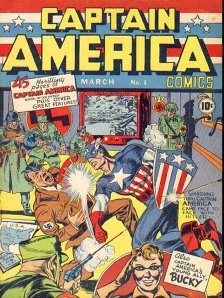 children, anymore and we should call them the more mature, meant-to-be-taken seriously, term: "graphic novel". The Captain America of the WWII era would have seen him punching out Osama bin Laden, the way he punched Adolf Hitler on the cover of one issue. Now, Captain America sees America as the problem, and our leadership as the real enemy; not the terrorists who want to kill us and destroy the freedoms that we enjoy.
children, anymore and we should call them the more mature, meant-to-be-taken seriously, term: "graphic novel". The Captain America of the WWII era would have seen him punching out Osama bin Laden, the way he punched Adolf Hitler on the cover of one issue. Now, Captain America sees America as the problem, and our leadership as the real enemy; not the terrorists who want to kill us and destroy the freedoms that we enjoy. This brings us to the new movie, where that last part is purposefully left out. I'm not going to blame it on liberal Hollywood elitism...but wtf(rak)? I realize that in the current world clime, where anti-American sentiments are running high, the part about fighting for "the American Way" grates on the nerves of the politically correct; and that the intentional decision to have those lines removed and make Superman a citizen-hero for the world, rather than a strictl
This brings us to the new movie, where that last part is purposefully left out. I'm not going to blame it on liberal Hollywood elitism...but wtf(rak)? I realize that in the current world clime, where anti-American sentiments are running high, the part about fighting for "the American Way" grates on the nerves of the politically correct; and that the intentional decision to have those lines removed and make Superman a citizen-hero for the world, rather than a strictl y American one, might be a purely business, monetary decision; but still, there's just something not right about it...to remove the "American" from an icon and symbol of America and American culture.
y American one, might be a purely business, monetary decision; but still, there's just something not right about it...to remove the "American" from an icon and symbol of America and American culture.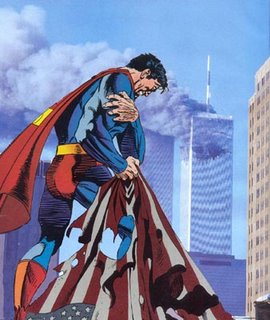
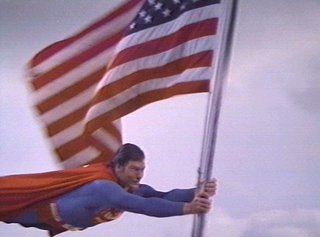 Hat tip to Kyrie, who provided a link in the comments section to her friend Tallguy. The photo is shamelessly stolen from his post (click on it to be led to it), and here is an excerpt:
Hat tip to Kyrie, who provided a link in the comments section to her friend Tallguy. The photo is shamelessly stolen from his post (click on it to be led to it), and here is an excerpt:So if Superman "belongs to the world", why isn't he fighting for communism? Why didn't he fight for the Axis, just to keep a level playing field? Why doesn't he seem like he'd be particularly pro-North Korea? In Superman IV: The Quest for Peace, Superman gets rid of all of the world nukes, which plays into Lex Luthor's diabolical scheme. I'd like to have seen what happened when the world devolved back into full scale conventional warfare, myself. Germany could have been reunited in 1987! Maybe not how we had liked, but what can you do?
Labels: movie review, superhero comics